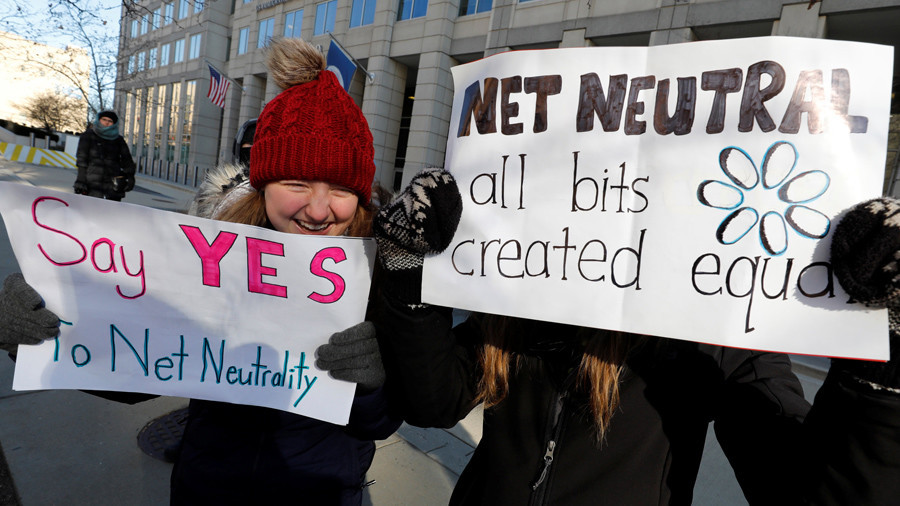FCC
repeals 'Net Neutrality' rule despite widespread protests

RT,
14
December, 2017
The
Federal Communications Commission has voted to repeal the rules
classifying internet providers as public utilities. Critics say this
will lead to pay-for-play behavior by providers, while FCC chair
argues it will benefit consumers.
The
Republican-majority commission voted along party lines on Thursday to
repeal the 2015 rules adopted under the Obama administration, which
classified ISPs as public utilities under a 1934 law intended to
regulate telephone service. FCC chairman Ajit Pai has argued that
these “heavy-handed” regulations throttled investment and
innovation and harmed poor and rural consumers.
“This
is not Thunderdome. The FCC is not killing the internet,”
Commissioner Brendan Carr said at the hearing on Thursday. “We are
not relying on market forces alone. We are not giving ISPs free reign
to dictate your online experience.”
“I
dissent from the contempt this agency has shown our citizens in
pursuing this path today,” said Commissioner Jessica Rosenworcel,
adding the repeal puts the FCC “on the wrong side of history.”
As
Pai was laying out his case for repeal, he was handed a note and
abruptly declared a recess. It was reported that the interruption was
due to a bomb threat. The commission reconvened about 20 minutes
later, after the room was declared safe.
“We
need to empower all Americans with digital opportunity, not deny them
the benefits of greater access and competition,” said Pai.
Dozens
of protesters held a vigil overnight before the FCC headquarters in
Washington, DC, accusing Pai of favoring his old employer – telecom
and ISP giant Verizon – and wanting to end net neutrality
altogether.
Web
companies such as Etsy, GitHub, Imgur, Kickstarter, Mozilla, Reddit,
Patreon, Pornhub, Pinterest and Tumblr have endorsed the protests,
cautioning that their products and services may be throttled by ISPs
if net neutrality was repealed.
Net
neutrality – also called the open internet – is the concept that
internet service providers (ISPs) must treat all online content
equally and not give preference to any one digital content provider.
Proponents
of the 2015 rules argued that they were necessary to preemptively
block ISPs from instituting “pay for play” plans and “fast
lanes” for favored content, while throttling other lawful content.
The
FCC chair disagreed, saying that the internet “wasn’t broken”
in 2015, and that the rules have harmed consumers by throttling
innovation and investment, as well as discouraging competition.
“Heavy
regulation always benefits the entrenched incumbents much more than
the upstarts,” Pai told the conservative Heritage Foundation in
November.
A
trade association representing many ISPs says that its members are
committed to net neutrality, but oppose the restrictive regulations.
“The
broadband industry has embraced and fostered the development of an
open Internet where companies do not block, throttle or otherwise
interfere with the customer’s desire to go wherever they want on
the internet. Consumers demand it and, more importantly, it makes
good business sense,” the the National Cable and Television
Association (NCTA) said in a statement.
The
Electronic Frontier Foundation (EFF) is not convinced the ISPs will
behave without rules, however. Absent the regulations, “nothing
will require ISPs to give the same quality of service even to apps
that pay the same amount, let alone those that can’t afford it,”
the EFF argued in its opposition to FCC's plans. “Content from an
ISP’s business affiliates or favored partners will be able to get a
fast lane no matter how much another website or app is willing to
pay.”
The
NCTA called on Congress to conclusively settle the debate on net
neutrality and adopt “bipartisan legislation that will end the
decades-old legal controversy and permanently enshrine enforceable
open internet principles in statute.”
Net
neutrality activists, however, call this a “solution in search of a
problem.” According to Evan Greer, campaign director at Fight for
the Future, “Title II enjoys immense bipartisan support amongst the
public and the courts agree it provides a solid legal foundation to
prevent anti-competitive abuse from ISPs.”
Moments
after the vote, New York Attorney General Eric Schneiderman (D)
announced he will lead a multi-state lawsuit against the decision.



No comments:
Post a Comment
Note: only a member of this blog may post a comment.